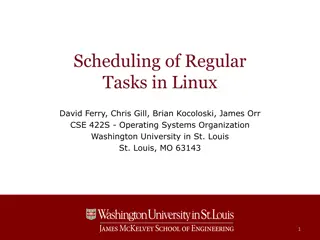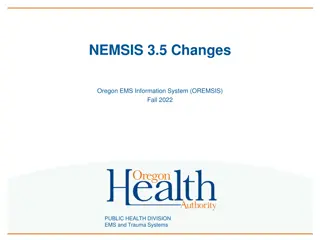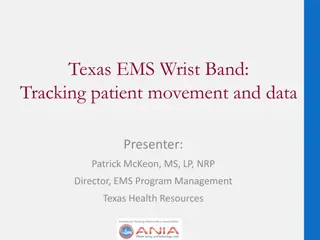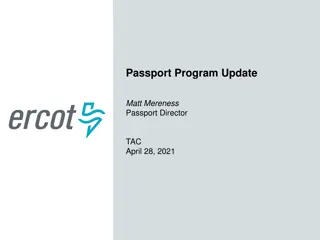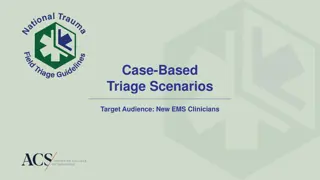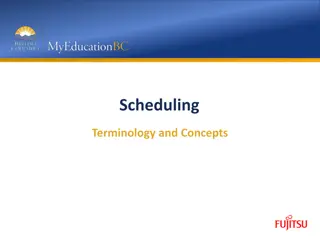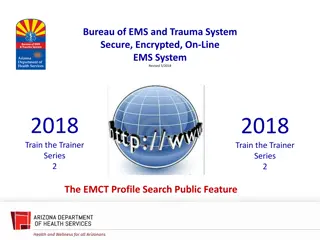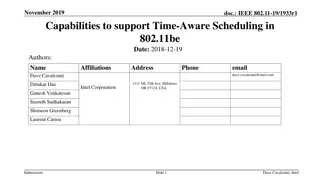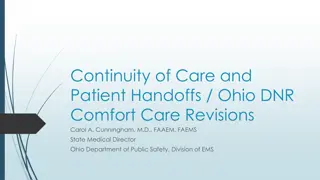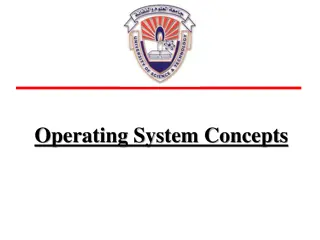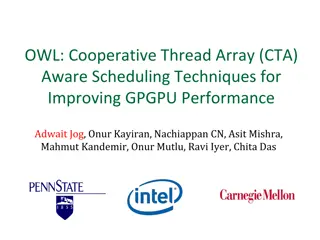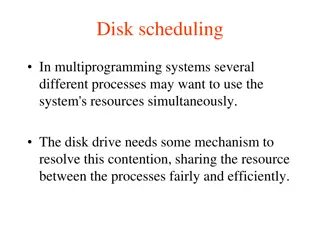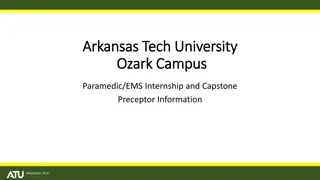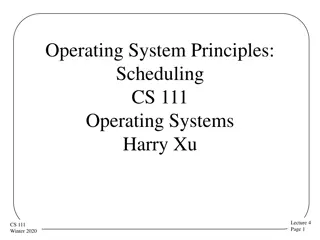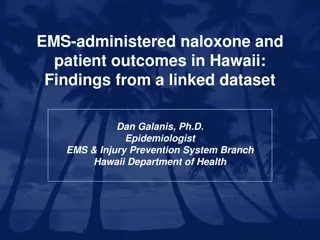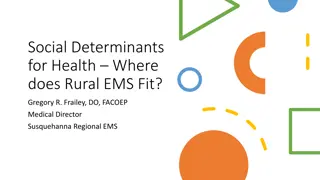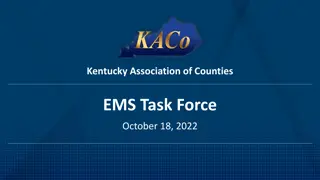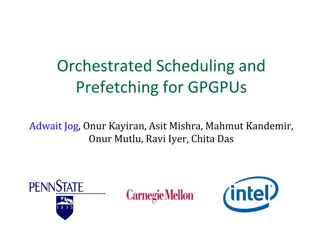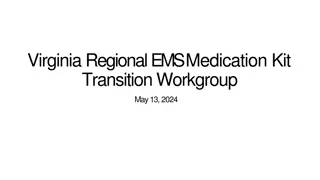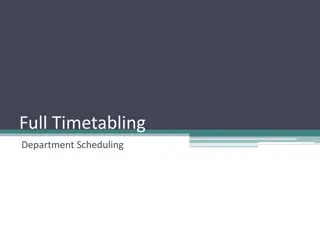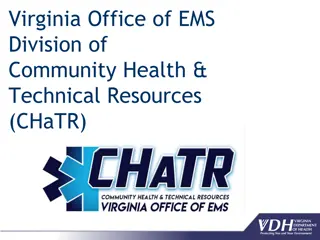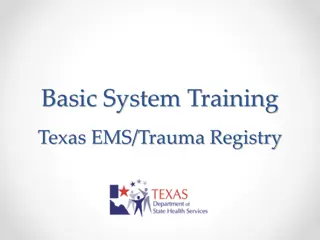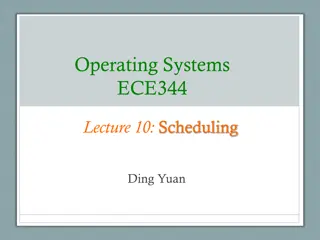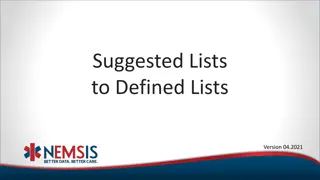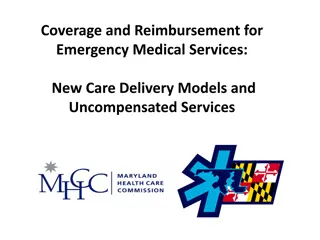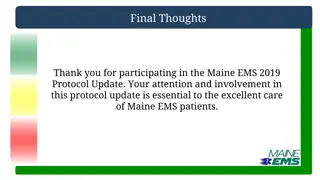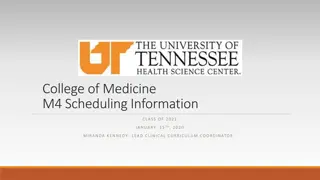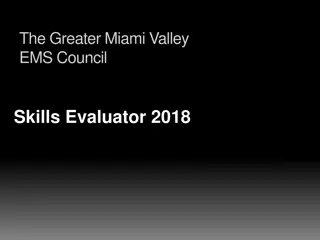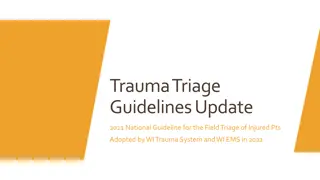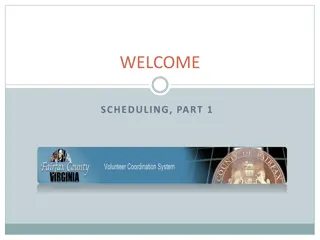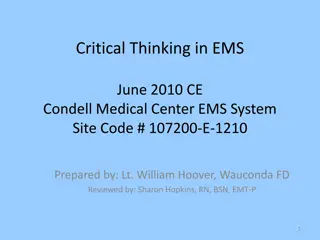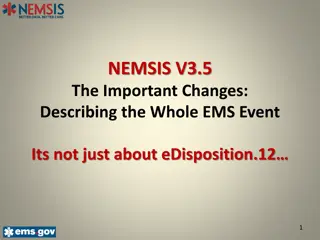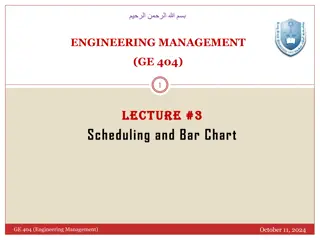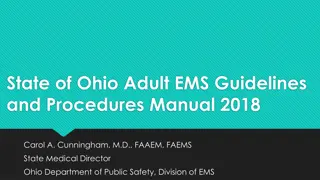Understanding Linux Process Scheduling and Priorities
Delve into the intricacies of process scheduling in Linux systems, covering topics such as task prioritization, process states, scheduler decisions, and important scheduling scenarios. Learn about traditional scheduling concerns like throughput and latency, as well as different types of workloads su
1 views • 19 slides
NEMSIS 3.5 Changes in Oregon's EMS Information System Fall 2022
Updated NEMSIS version 3.5 brings significant changes to Oregon's EMS Information System, aiming to help agencies transition from 3.4 to 3.5 by 2022-2023. Oregon is implementing newly collected elements and replacing certain data entry elements to enhance statewide data collection efforts in EMS and
0 views • 39 slides
Texas EMS Wristband Project Overview
The Texas EMS Wristband project, initiated in 2020, aims to enhance patient tracking during large-scale events by using wristbands with unique barcodes applied by EMS providers. These wristbands help link pre-hospital and hospital records, track patients during disasters, mass casualty incidents, an
1 views • 9 slides
ERCOT Passport Program Update and EMS/RTC Bifurcation Summary
ERCOT's Passport Program Update includes details on the Scope and Delivery for 2020-2024, the bifurcation of EMS Upgrade and RTC, and the reason for the separation of EMS/Passport. The program objectives, challenges faced in the EMS upgrade schedule, and the decision to separate the EMS Upgrade from
0 views • 13 slides
Case-Based Triage Scenarios for New EMS Clinicians
These case-based scenarios are designed to train new EMS clinicians on applying the National Guideline for Field Triage of Injured Patients. Each scenario presents a patient for assessment and triage decision-making, considering varying EMS and trauma system resources. The goal is to enhance decisio
0 views • 35 slides
Understanding Scheduling Terminology and Concepts in MyEdBC
Explore the key terminology and concepts related to scheduling in MyEdBC, including the Build view, scenarios, flat and rotated schedules, patterns, and base terms. Get insights into setting up scheduling structures and preferences, as well as managing course requests and staff information. Enhance
1 views • 13 slides
Bureau of EMS and Trauma System Secure Online EMS System Overview
The Bureau of EMS and Trauma System offers an online platform that allows the public to search for Emergency Medical Care Technicians (EMCT) by name or certification number. The system provides access to EMCT profiles, including information such as certification status, level, issuance and expiratio
2 views • 21 slides
GPU Scheduling Strategies: Maximizing Performance with Cache-Conscious Wavefront Scheduling
Explore GPU scheduling strategies including Loose Round Robin (LRR) for maximizing performance by efficiently managing warps, Cache-Conscious Wavefront Scheduling for improved cache utilization, and Greedy-then-oldest (GTO) scheduling to enhance cache locality. Learn how these techniques optimize GP
0 views • 21 slides
Time-Aware Scheduling Capabilities in IEEE 802.11be
Describing necessary enhancements to enable Time-Aware Scheduling in IEEE 802.11be for time-sensitive applications. The focus is on aligning with the 802.1Qbv standard to address latency, jitter, and reliability issues, presenting a structured outline of requirements and configurations essential for
0 views • 24 slides
Understanding Scheduling Algorithms in Operating Systems
Exploring the world of scheduling in operating systems, this content covers various aspects such as introduction to scheduling, process behavior, bursts of CPU usage, CPU-bound and I/O-bound processes, when to schedule processes, and the differences between non-preemptive and preemptive scheduling a
0 views • 34 slides
Enhancing Patient Handoffs and Continuity of Care in EMS Settings
This document discusses the critical aspects of patient handoffs and continuity of care in emergency medical services (EMS) settings. It highlights the challenges faced during patient transitions and emphasizes the importance of effective communication and collaboration between EMS providers and rec
0 views • 14 slides
Understanding CPU Scheduling in Operating Systems
In a single-processor system, processes take turns running on the CPU. The goal of multiprogramming is to keep the CPU busy at all times. CPU scheduling relies on the alternating CPU and I/O burst cycles of processes. The CPU scheduler selects processes from the ready queue to execute when the CPU i
1 views • 26 slides
Improving GPGPU Performance with Cooperative Thread Array Scheduling Techniques
Limited DRAM bandwidth poses a critical bottleneck in GPU performance, necessitating a comprehensive scheduling policy to reduce cache miss rates, enhance DRAM bandwidth, and improve latency hiding for GPUs. The CTA-aware scheduling techniques presented address these challenges by optimizing resourc
0 views • 33 slides
Simplifying Residency Shift Scheduling with Mathematical Programming Techniques
This project, led by Professor Amy Cohn and William Pozehl, aims to demonstrate how mathematical programming techniques can simplify the complex task of residency shift scheduling. The Residency Shift Scheduling Game highlights the challenges of manual scheduling and the ease of using mathematical p
1 views • 37 slides
Understanding Disk Scheduling in Multiprogramming Systems
In a multiprogramming system, several processes may contend for disk resources. Disk scheduling aims to efficiently share the disk drive's resources among processes, maximizing I/O request satisfaction while minimizing head movement. Various disk scheduling policies like FCFS, SSTF, and SCAN aim to
1 views • 22 slides
Arkansas Tech University Ozark Campus Paramedic/EMS Internship Information
Providing EMS education since 1996, Arkansas Tech University Ozark Campus offers an Associate of Applied Science in Paramedic/Emergency Medical Service. They have various partnerships for internship placements and emphasize the role of EMS field preceptors in guiding students. Remembering the qualit
0 views • 26 slides
Understanding Operating System Scheduling Principles
Operating system scheduling involves making decisions on resource allocation among multiple clients, determining who gets to use the resource next and for how long. Different scheduling algorithms aim to achieve specific goals, such as maximizing throughput, minimizing waiting time, ensuring fairnes
0 views • 57 slides
Key Points for Efficient EMS Handoff Process
Implementing a streamlined EMS handoff process involves key points such as getting timely reports, utilizing blood draws, reducing confusion in handoff, and starting the handoff conversation effectively. The use of acronyms like TIMEOUT enhances communication efficiency and ensures all necessary asp
0 views • 14 slides
EMS-Administered Naloxone and Patient Outcomes in Hawaii: Epidemiological Study
This study presents findings from a linked dataset analyzing EMS-administered naloxone and patient outcomes in Hawaii from 2012-2016. Part 1 covers basic epidemiological descriptions and linkage to hospital billing data, while Part 2 investigates associations between EMS response times and patient o
0 views • 14 slides
Understanding the Role of Rural EMS in Addressing Social Determinants of Health
Discussing how rural EMS can participate in addressing social determinants of health without compromising their safety net role. Proposals for systematic changes, financial mechanisms, personnel requirements, and communication needs are evaluated. The content also covers the basic needs of the popul
0 views • 31 slides
Overview of EMS Services in Kentucky Counties
Kentucky Association of Counties' EMS Task Force meeting on October 18, 2022, highlighted the significant involvement of counties in EMS services in Kentucky. It discussed various county roles in EMS, funding models, workforce statistics, and provided contact information for key individuals. The dat
0 views • 4 slides
Orchestrated Scheduling and Prefetching for GPGPUs
This paper discusses the implementation of an orchestrated scheduling and prefetching mechanism for GPGPUs to enhance system performance by improving IPC and overall warp scheduling policies. It presents a prefetch-aware warp scheduler proposal aiming to make a simple prefetcher more capable, result
0 views • 46 slides
Virginia Regional EMS Medication Kit Transition Workgroup Meeting Summary
During the Virginia Regional EMS Medication Kit Transition Workgroup meeting on May 13, 2024, various important topics were discussed. The agenda included introductions, updates on the final DEA ruling, BOP meeting outcomes, team reports, transition status reports, and open forum discussions. Notabl
0 views • 16 slides
Efficient Department Scheduling for Timetabling Success
Efficient timetabling for a department involves various stages like data entry, draft timetable creation, feedback collection, production of the final timetable, schedule adjustments, and publication. Key information needed includes faculty availability, room inventory, specific scheduling parameter
0 views • 59 slides
Virginia Office of EMS - Community Health & Technical Resources Overview
The Virginia Office of EMS, Division of Community Health & Technical Resources (CHaTR), focuses on Mobile Integrated Healthcare/Community Paramedicine, disease management, identifying underserved populations, fostering partnerships, and offering technical assistance for EMS workforce development. Th
0 views • 10 slides
Basic System Training Texas EMS/Trauma Registry Overview
Explore the agenda, logging in process, password requirements, main dashboard features, and user profile editing in the Basic System Training for Texas EMS/Trauma Registry. Learn how to enter new records, search for existing ones, and access recently opened records efficiently. Discover the function
0 views • 66 slides
Understanding Scheduling in Operating Systems: A Comprehensive Overview
This content delves into the intricate details of scheduling in operating systems, covering the goals, various scheduling algorithms, multiprogramming concepts, decision-making processes for resource allocation, timing considerations, scheduling objectives, and performance criteria such as throughpu
0 views • 42 slides
Streamlining EMS Documentation: Defined Lists for Efficient Patient Care
EMS clinicians face challenges in documentation due to extensive lists of values. The transition from suggested to defined lists, initiated in 2016 and refined in 2019, aims to improve documentation accuracy by presenting commonly used values to providers during patient care instances. This process,
0 views • 12 slides
Enhancing Reimbursement for Emergency Medical Services: SB 682 Focus
Explore the shift towards new models of Emergency Medical Services (EMS) care delivery under SB 682, aiming to address challenges such as ED overcrowding, long wait times, and reduced EMS capacity. The focus is on developing sustainable reimbursement strategies for innovative EMS models, including t
0 views • 25 slides
Maine EMS 2019 Protocol Update: Final Thoughts and Training Considerations
Participation in the Maine EMS 2019 Protocol Update is vital for optimal patient care. Additional training in various topics, such as naloxone administration, stroke scales, and surgical cricothyrotomy, is recommended at different EMS levels. Deliberate review of specific areas like recognizing sign
0 views • 5 slides
College of Medicine M4 Scheduling Information for Class of 2021
Important scheduling timeline information for 4th-year medical students at the College of Medicine. Key dates include deadlines for hardship requests, core clerkship preferences, Geriatrics/Palliative Medicine enrollment, scheduling rounds, and publication rules. Compliance with specific requirement
0 views • 8 slides
Skills Evaluator Update & Protocol Changes for EMS Providers
Enhance your skills evaluation with the Greater Miami Valley EMS Council's 2018 update. Explore standing order changes, role responsibilities for skills evaluators, and guidelines for managing required and optional skills stations. Learn how to efficiently conduct Mega-Codes and ensure compliance wi
0 views • 14 slides
Improving Job Scheduling with Nudge Policy
Explore the innovative Nudge policy for stochastic improvement upon First-Come-First-Served (FCFS) scheduling. The Nudge policy introduces a new approach with better performance tradeoffs compared to traditional scheduling methods. Discover how Nudge outperforms FCFS across various job size distribu
0 views • 21 slides
Field Triage Guidelines Update 2021: National Guideline for Injured Patients
The 2021 update of trauma triage guidelines aims to streamline destination decisions for injured patients. The new guideline emphasizes assessing vital signs, mechanisms of injury, and special considerations to ensure optimal patient outcomes. Key objectives include describing the update process, ex
0 views • 41 slides
Job Scheduling Across Geo-distributed Datacenters
Scheduling jobs across geo-distributed datacenters poses challenges such as optimizing job completion time, reducing data transfer costs, and coordinating tasks across multiple locations. Various strategies like reordering-based approaches and scheduling heuristics are explored to enhance job schedu
0 views • 32 slides
Insights into Volunteer Scheduling and Management
Exploring the intricacies of volunteer scheduling, this informative guide covers topics such as creating schedule slots, weighing the pros and cons of scheduling, opportunity scheduling, monthly calendars, slot summaries, volunteer and opportunity listings, and more. Dive into the world of volunteer
0 views • 21 slides
Enhancing Critical Thinking Skills in EMS: A Comprehensive Guide
Explore the importance of critical thinking in Emergency Medical Services (EMS) through identifying patient care influenced by biased decision-making, communication issues, transportation options, and more. Delve into real-life lawsuits impacting EMS providers and the role of Standard Operating Proc
0 views • 52 slides
Advancements in NEMSIS V3.5: Beyond eDisposition 12
NEMSIS V3.5 introduces significant changes aiming to enhance the description of EMS events beyond just eDisposition 12. The primary goal is to allow for a more detailed and flexible representation of EMS events, addressing limitations in previous versions. The update covers a wide range of improveme
0 views • 24 slides
Overview of Project Scheduling in Engineering Management
The lecture covers planning and scheduling in engineering management, focusing on activity and event scheduling techniques, bar charts, critical path analysis, and addressing project scheduling principles. It discusses the objectives of the lecture, the difference between planning and scheduling, th
0 views • 29 slides
Ohio Adult EMS Guidelines and Procedures Manual Overview
The State of Ohio Adult EMS Guidelines and Procedures Manual, led by Dr. Carol A. Cunningham, serves as a foundational resource for EMS medical directors in Ohio. It incorporates elements from the NASEMSO National Model EMS Clinical Guidelines, aligning with Ohio's EMS scope of practice. The manual
0 views • 14 slides
